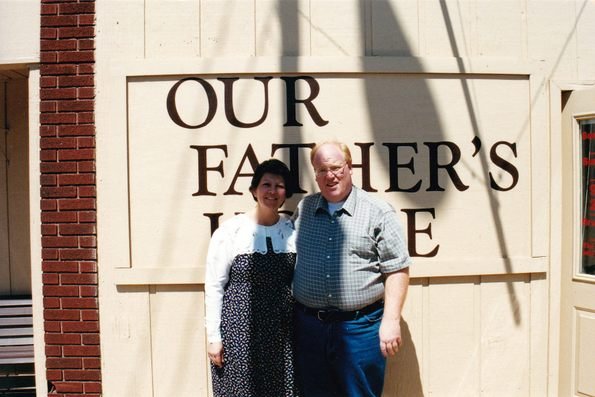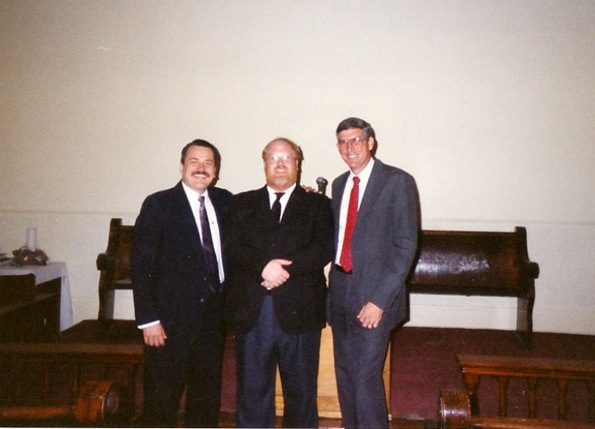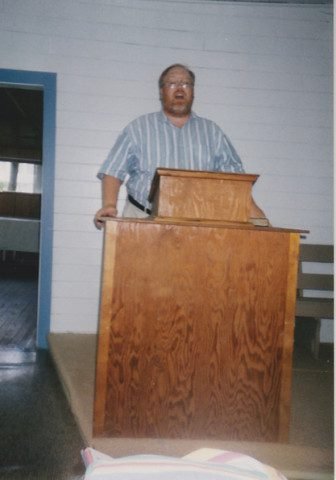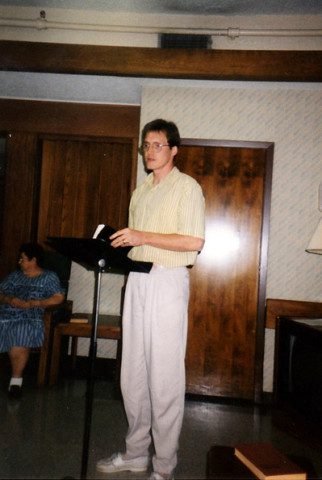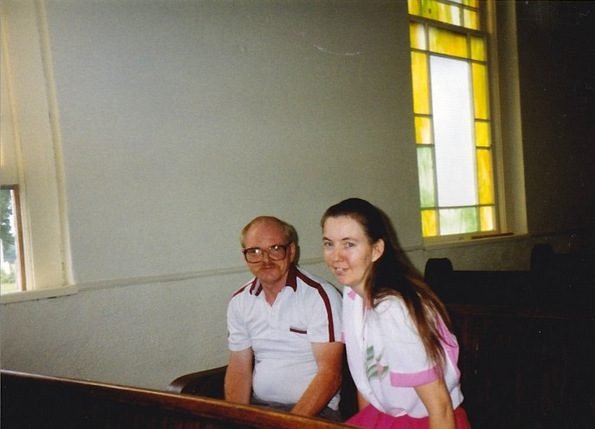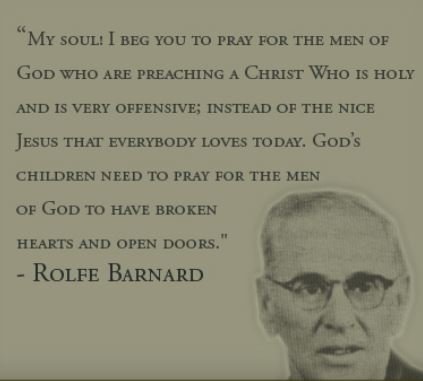
My friend Eric Skwarczynski, the publisher of the Preacher Boys Podcast, had this to say on Facebook today:
Been thinking quite a bit this month about why we change beliefs.
So often I release a horrific story of abuse within a church and it seems to have no effect within IFB circles. They simply deny it’s part of a larger problem and move right along until the next case happens, or the next case happens.
No matter how much effort I throw into putting a story together — it can feel like a drop in a bucket when it comes to actually moving any sort of needle.
I’m curious, if you’ve left a toxic church environment you used to blindly submit to, what was the catalyst?
What finally opened your eyes?
I want to be more thoughtful in crafting content to persuade people who legitimately don’t see these issues to open THEIR eyes.
Those of us who are neck-deep in the waters of Independent Fundamentalist Baptist (IFB) abuse and scandal often wonder how anyone could still be an IFB church member. We said the same thing about Roman Catholics. Can’t people see the perversion and evil all around them? How can they justify continuing to support these institutions and pastors with their attendance and money?
While some people do exit IFB churches stage left, never to return, most members stay committed to the cause. Some of them will change churches, but hold on to the same core beliefs that fueled the scandals. My wife’s uncle, the late Jim Dennis, (please see The Family Patriarch is Dead: My Life With James Dennis) pastored the Newark Baptist Temple in Newark, Ohio for fifty years. A strident IFB congregation, the Baptist Temple had several major sexual abuse scandals during Dennis’ tenure. In each instance, the scandal was not talked about from the pulpit. Church members were told to trust that their pastor and deacons had everything under control. Polly’s parents attended the Baptist Temple during the time of these scandals. When I asked about what exactly happened — I had a general idea — Mom and Dad told me they didn’t know. And here’s the thing, Jim Dennis was their brother-in-law. He never told them what happened. There should have been a public meeting on these scandals so there were no questions about who did what, where, when, and how, and what the church was doing to make sure that such criminal behavior never happened again. One man went to prison for his crimes, but today? He is faithfully serving Jesus in another IFB church.
Many IFB adherents think that sexual misconduct by pastors, evangelists, missionaries, youth directors, deacons, Sunday school teachers, nursery workers, bus drivers, and janitors, to name a few, is rare. Thus, they use the “few bad apples” argument to justify their continued support of the IFB church movement. Of course, for those of us who regularly report on IFB scandals, we know there are a hell of a lot more rotten apples than eyes-closed believers are willing to admit.
Many IFB adherents believe that their sect/church/pastor has the corner on truth. In fact, they are absolutely certain that their church is the right church; their pastor is a supernaturally called man of God. That is, until their pastor says something they disagree with, then they are ready to leave and find a church that preaches the truth; one that “feeds” them. Such lateral moves are common, with people entering through the front door, and others leaving — often with the pastor’s boot in their ass — through the back door.
When you believe your church and your pastor are the repositories of truth, you are often more willing to justify bad behavior within the church, thinking that “God” will sort everything out. Of course, one thing is for certain, God never sorts anything out. It is up to people of courage and conviction to do what is right, regardless of how it affects the “testimony” of the church. I would rather be known for being the church that swiftly dealt with a child molester than one that covered his crimes up and protected him. The late Jack Hyles, pastor of First Baptist Church in Hammond, Indiana, upon learning of his son David’s serial sexual predation, covered things up and sent him off to pastor an IFB church in Texas. David Hyles continues to minister in some corners of the IFB world. Why? Well, Jesus forgave him, so shouldn’t everyone else do the same? Hyles refuses to own his past criminal behavior, and has not attempted to make restitution to teen girls and adult women he harmed. Hyles has repeatedly stated that God has forgiven him and that’s all that matters.
IFB churches are often multi-generational institutions. When you are born into a church and a belief system, it is hard to walk away, even when you know you should. When your parents, siblings, grandparents, and in-laws attend the same IFB church, it is difficult to move on to another church or stop attending church altogether. I know several atheists who, for the sake of their families, still attend IFB churches. I couldn’t do it, but I do understand why they do.
I was an Evangelical Christian for fifty years. Thirty-two of those years were spent in the IFB church movement. I attended IFB churches as a youth. I was saved, baptized, and called to preach in an IFB church, Trinity Baptist Church in Findlay, Ohio. I attended an IFB college, married an IFB preacher’s daughter, and pastored three IFB churches and two IFB adjacent churches. IFB blood coursed through my veins for much of my life. I was totally committed to IFB beliefs and practices. Yet, here I am today, an unrepentant atheist; a man labeled a heretic, false prophet, and apostate. What happened?
Certainly, the Jack and David Hyles scandals in the 1980s certainly made me wonder about the moral foundation of the IFB church movement, but that wasn’t enough to make me walk away. The constant internecine wars among IFB churches, pastors, and institutions caused me to wonder about the movement too. So much ugliness, hatred, judgmentalism, and finger-pointing. How can we call ourselves followers of the Prince of Peace and act like this?
By the late 80s, I abandoned the IFB moniker and embraced a different form of Baptist Fundamentalism, Sovereign Grace, and Reformed Baptist. While this move delivered me from some of the worst excesses of the IFB church movement, its poison remained to some degree until I pastored my last church in 2003. After leaving the IFB church movement, I pastored a Sovereign Grace Baptist church, a Christian Union church, a non-denominational church, and a Southern Baptist church. All of these churches had IFB tendencies theologically, but less so when it came to social strictures.
Stepping away from the IFB church movement allowed me to question and doubt. Not big questions, at first, but questions, nonetheless. As an IFB pastor, I was the answer man, not the question man. Congregants expected me to be some sort of oracle, a library of divine truth. Thus saith the Lord? Nah, thus saith Bruce what saith the Lord. Most congregants were infrequent students of the Bible. Were they bad Christians? Of course not. They had jobs, families, and homes to tend to. I, on the other hand, could spend hours a day and days each week reading and studying the Bible. I had the leisure time that they did not to devote myself to God, the Bible, and the ministry.
The first crack in my Christian facade came when I started reading books outside of the Evangelical rut; authors considered mainline, progressive, liberal, emerging church, or even secular. With knowledge came more questions and doubts. I determined to follow the path wherever it led. I met truth in the middle of the road, refusing to back up or go around. This journey ultimately led me to conclude that the central claims of Christianity were untrue; that the Bible was not divinely inspired, inerrant, or infallible.
Ultimately, it was the freedom to ask questions, read books from any author, and wander the path of life that led to my deconversion. Come the last Sunday in November, it will be fifteen years since Polly and I walked out the door of the Ney United Methodist Church, never to return.
Over the past decade and a half, I have learned that arguing with devoted IFB believers doesn’t work. They think they are “right” and you are “wrong.” Dr. David Tee continues to rage against me and the readers of this blog. One claim he has made countless times is that unbelievers have nothing to offer to the world; that they don’t know anything about the Bible; that their words should be ignored. While Tee, whose real name is Derrick Thomas Thiessen, wasn’t IFB, he was part of a sect, the Christian and Missionary Alliance (CMA), that had IFB tendencies. That’s why he exhibits IFB tendencies in his writing, comments, and emails. No amount of arguing with Tee will change his mind. None. Until he dares to consider that he might be wrong, there’s no hope for him or anyone else who thinks like him, for that matter.
I need to frequently remind myself that most of the people who read this site never leave a comment or send me an email. I do know that my articles about the IFB church movement are frequently accessed, so I am confident that I am either irritating the hell out of a lot of IFB believers, or my words are quietly making a difference. I get enough email from people who left the IFB church movement to know that my writing is reaching people and helping them to see that there are better expressions of faith than IFB churches; that it is even okay to have no faith at all.
Fundamentally, I am a storyteller. The byline for this site says: One Man’s Journey from Eternity to Here. I tell people, I am just one man with a story to tell. Eric is a storyteller too. His videos and interviews have reached countless people, and, if nothing else, say to people who are struggling with their IFB pasts that they are not alone. It is by these testimonies we should justify and judge the success of our work, and not the angry, hateful attacks of self-righteous, arrogant IFB preachers. If these so-called men of God want to have honest, open discussions, I am more than willing to do so. I have nothing to hide. I should warn them, however: talking to me can be dangerous. Several IFB preachers ended up deconverting after lengthy discourse with me; finding that they were not as “right” as they thought they were; that their Fundamentalist Baptist beliefs could not be rationally sustained.
I don’t evangelize. All I know to do is tell my story and let the words fall where they may. Last year, I spoke via Zoom with an Amish-Mennonite group in Pennsylvania. I had a delightful time sharing my “testimony” and answering their honest, sincere questions. The pastor told me later that none of the men became atheists — no surprise, right? — but they were talking among themselves about what I shared with them. Who knows what may come of our interaction with each other? Isn’t that all any of us can do? (And if you would like me to come and speak at your church, I am more than happy to do so.) 🙂
Change comes when open ourselves up to the possibility of being wrong; that possibly, just maybe we might have wrong or distorted beliefs. Make no mistake about it, change is hard. I didn’t deconvert until the age of fifty, and neither did my wife. MY counselor told me years ago that it is rare for someone my age to walk away from their faith; that sunk costs, family, and social connections make it hard for someone like me to blow up their life and walk a different path (and that’s why I don’t criticize people who can’t do so. To quote the old gospel song, “I’ver come too far to turn back now.” But turn back I did, and I couldn’t be happier. I paid a heavy price for doing so — the loss of community still beats down on me — but if I had to do it all over again, I would. I am a better man, husband, father, and neighbor than I was before, and for that I am grateful. (I talk extensively about these things in the posts posted on the Why? page.) Will your life turn out as mine has if you deconvert? We can’t possibly know. I know people who have paid a heavy price for walking away from their tribe’s religion, often being cut off from their families and even their inheritances. Others have been kicked out of their homes or had their cars repossessed. That’s why I tell people to carefully consider the cost before saying out loud you are no longer a believer, that you are an atheist, or even that you are attending a nicer, gentler Christian church or another religion altogether. (Please see Count the Cost Before You Say “I am an Atheist.”)
Eric asked,
If you’ve left a toxic church environment you used to blindly submit to, what was the catalyst? What finally opened your eyes?
Please share your thoughtful answers in the comment section.
Bruce Gerencser, 68, lives in rural Northwest Ohio with his wife of 47 years. He and his wife have six grown children and sixteen grandchildren. Bruce pastored Evangelical churches for twenty-five years in Ohio, Texas, and Michigan. Bruce left the ministry in 2005, and in 2008 he left Christianity. Bruce is now a humanist and an atheist.
Your comments are welcome and appreciated. All first-time comments are moderated. Please read the commenting rules before commenting.
You can email Bruce via the Contact Form.

